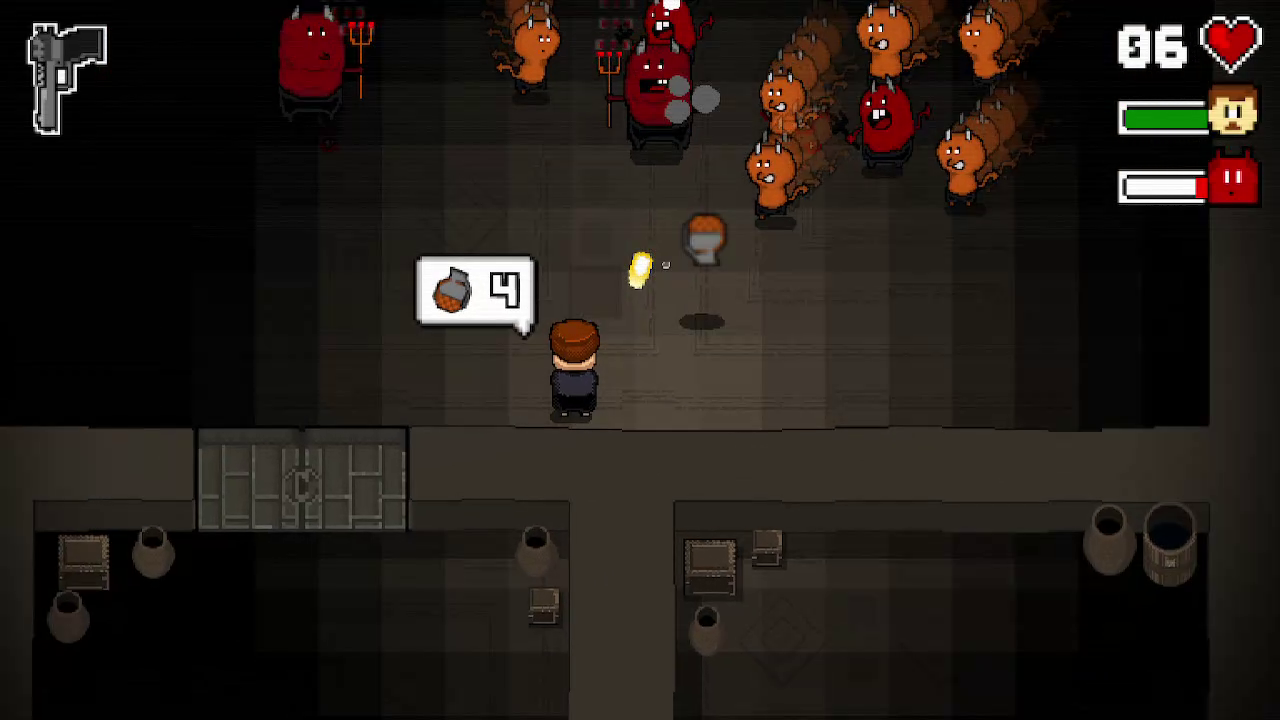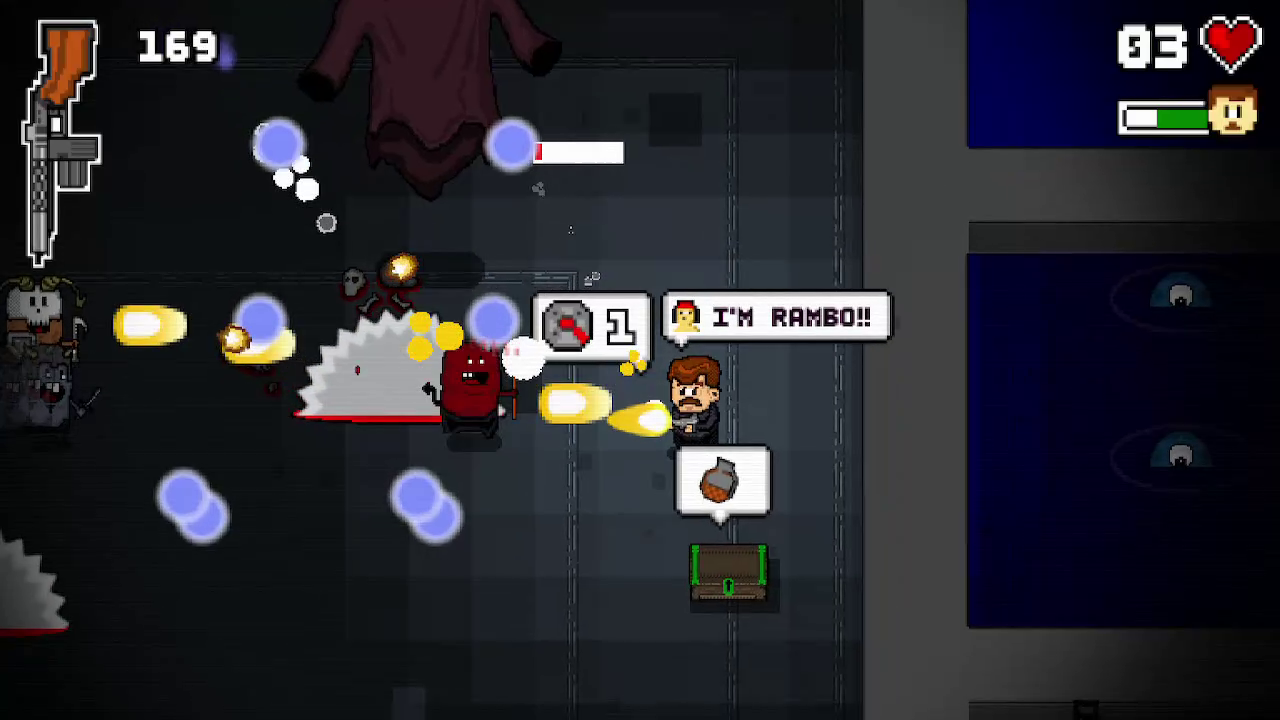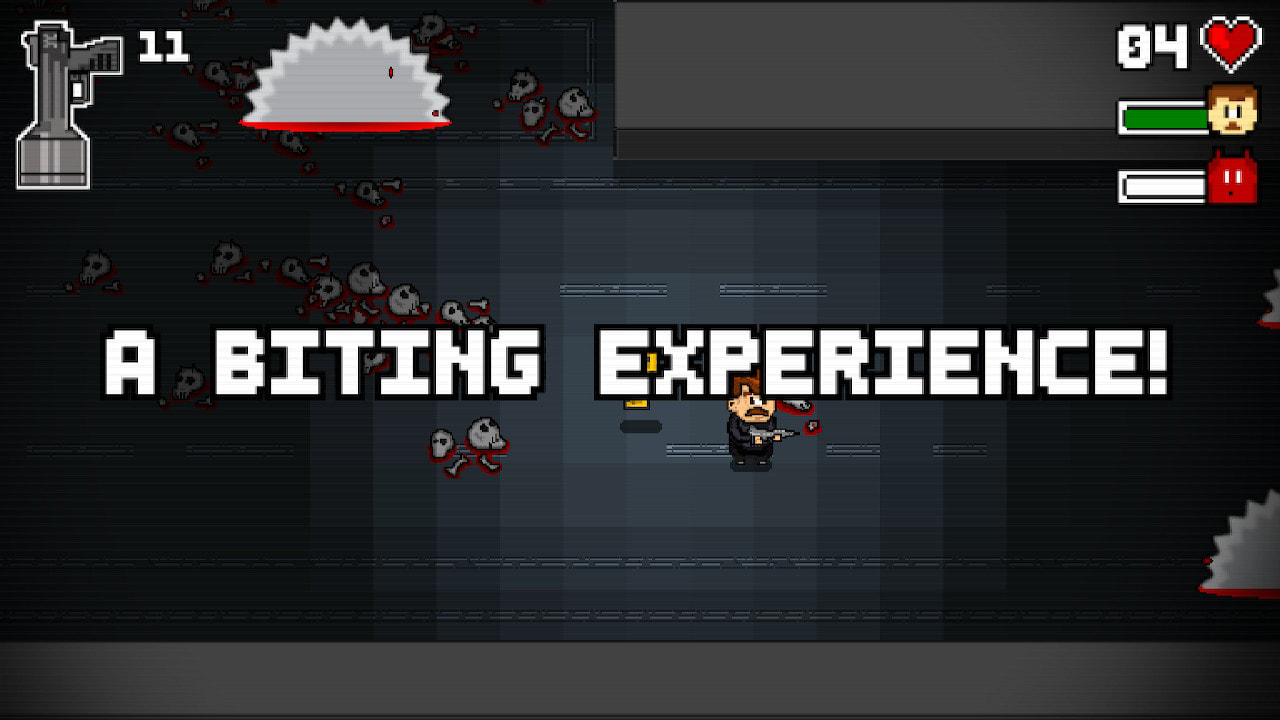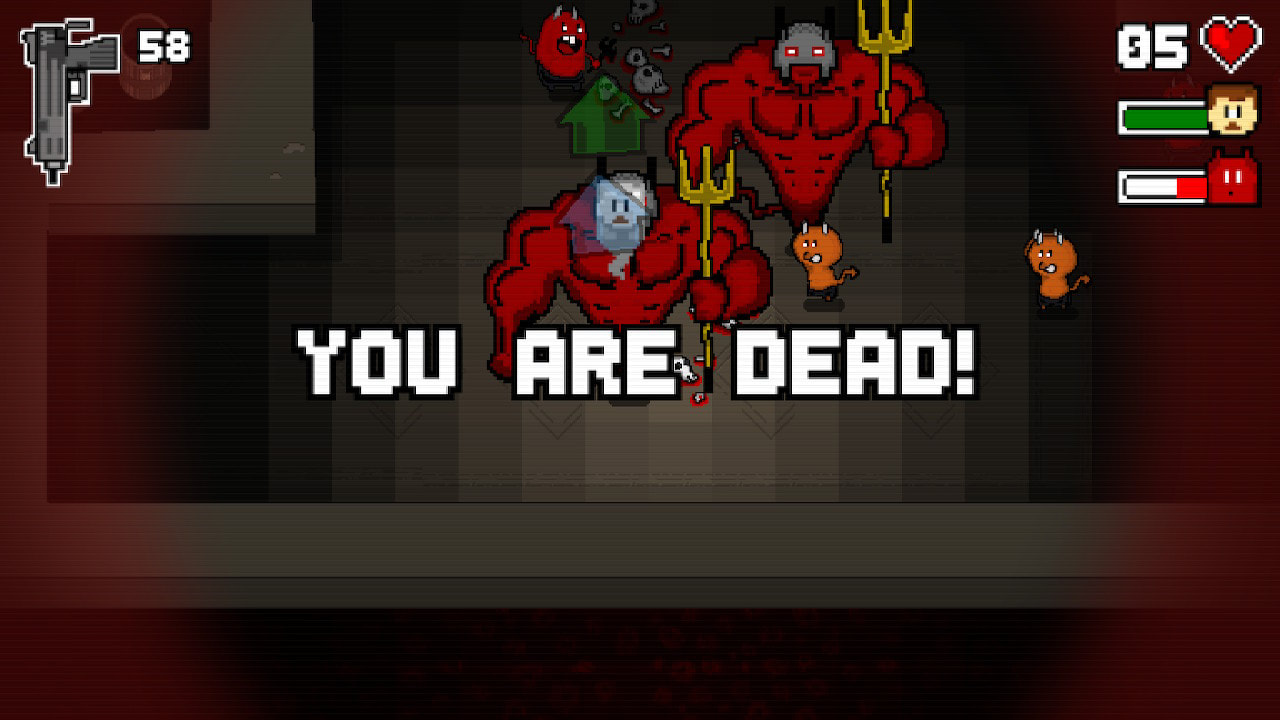|
By Al Players: 1 Platforms: Nintendo Switch, XBox, PlayStation 4 It's been a while since we've had the pleasure to look at a twin stick shooter that wasn't also a roguelike, but that changes now with the arrival of Mustache In Hell. Coming to consoles by way of QUByte Interactive, following an earlier release on Steam, it promises action-packed gameplay set literally in Hell. Hopefully that very unique setting doesn't bleed into the gameplay, or we might have quite the game on our hands. We won't know anything until we dive into the game though, so let's get on with it already. Get those mustaches ready! Mustache In Hell puts you into the shoes of one John Mustache, a police officer (ACAB by the way) that's a mix of 80s action movie tropes, and 90s first person shooter vibes. He goes to sleep one night only to wake up in Hell the next morning. Not knowing what to make of all this, he wanders forth and is met by the Grim Reaper. It seems that John is next on his list, but he's willing to let all that go if he can complete a task for him. The Grim Reaper wants Mustache to gather four orbs, placed within each region of Hell, and take on the Big Guy himself in a final area known simply as "Pandemonium". Since his only other option is to accept an early death, not to mention an eternity in Hell, Mustache agrees to this deal and dives head first into five levels of madness. Within each level he finds books that detail what horrors control that specific region of Hell, but John is always ready with a quip or two when he faces them. The story isn't the strongest, but it does have lots of humorous moments that drive the game forward. It also may not have a lot of twists, turns, and surprises, but the premise allows for some intense enemies and boss encounters. I assume that no one really comes to an arcade-style twin stick shooter expecting a deep story though, so I guess the somewhat thin plot can be forgiven. The gameplay loop in Mustache In Hell is rather simple, you clear each area of enemies, and you get that area's cube at the end. Each of the five zones of Hell are very maze-like, and have several rooms that are either empty, filled with enemies, occupied by NPCs or items, or those books mentioned earlier. Most doors are locked, so you have to find keys to unlock them. These are found in chests either randomly or after completing a combat area, and the game will actually guide you to the next door you need to unlock after you pick up a key. While most paths are long and narrow, once you enter a large room you'll usually find yourself a fight. Controls are very simple, the left stick moves Mustache, the right shoots in the direction it's pointed in, and the only other button is used to launch your secondary weapon. These combat areas will see enemies come at you in continuous waves, with there being two ways to wipe them out. The main way you'll deal with enemies is by defeating enough of them so that the Enemy Meter fully depletes. Think of this like a life bar that represents an entire horde of monsters rather than just one enemy. The other way you'll have to clear these areas is to find the sub-boss of the group and defeat it. You'll always be able to tell which kind of scenario you're in by the presence, or lack, of the Enemy Meter. After you defeat the current wave of enemies, the room will clear and you'll usually be given a key to go to the next room. Oh, and all combat areas will lock you in when you enter them, so don't even think about running away. It's also worth mentioning that most room hazards, like saws, automatic guns, etc., will still be active until you leave the room, so watch out for any cheap last minute hits. That's pretty much all you'll do until you reach the boss of the. Most boss encounters typically mix both combat types, where you'll have both an Enemy Meter AND a big enemy you have to kill to move on. These encounters are probably the best part of the game though, and the bosses themselves all stand out in their own ways. John Mustache is armed with only a pistol at the start of the game, but he can pick up better weapons during the combat areas. Since these areas are rather large, their placement is telegraphed by arrows that point you towards guns and/or secondary weapons. These are both picked up from chests, and there is always an icon above chests showing you what is inside of then. Secondary weapons come in the form of mines and grenades, which act as you'd expect, and help clear large groupings of enemies. Obviously grenades work better than mines as you'll more than likely want to stay on the offensive. Gun pickups vary by level, with each subsequent stage adding an additional weapon into the rotation. These weapon pick-ups can be shotguns, machine guns, flamethrowers, and so on. They all have limited ammo, so it's best to make each shot count when you pick them up. You'll always have your pistol to fall back on if you run out of ammo with one of the special weapons, and thankfully the pistol has a never-ending supply of bullets. Don't worry if you run out of ammo though, as new weapons will spawn in a few seconds after you shoot the last bullet. This may seem like a great thing at first, and it really can be most of the time, but the randomness of the drops means that they can spawn in the middle of a horde of enemies. Since you lose all extra weapons when you die, it's best to consider how badly you need a pick-up if it's placed in a dangerous area. While you do keep any leftover ammo between combat sections, you don't pick up any new weapons in the level outside of them. The only items you pick up in the general areas of the levels are extra lives, meat that restores health, keys, and special bonus items that I'll talk more about later. Damage and difficulty is next up for discussion, and sadly it's here that I think Mustache In Hell falters a bit. The game is very tight and responsive for the most part when it comes to controls and hit detection, but there were countless times when damage seemed to come out of nowhere. Projectiles often inflicted damage if they were simply near me, and there were also times when I was able to walk through enemies unscathed. While the latter was obviously working in my favor, the fact that it was so hit or miss made it hard to reliably play the game. There were some levels where I barely completed them on my final life, and some where hardly anything could touch me. This partly had to do with weapon RNG (since some weapons are better than others), but it also had just as much to do with hit detection being totally left up to chance. That said, I never felt that the game was overly difficult or unfair. It wasn't easy by any means, but things usually worked well enough where I only occasionally got annoyed by some wonky aspects of the game. In case I haven't made it too clear, I really enjoyed my time with the game and was able to overlook its issues due to the fact that it hooked me with its charm early on. I was actually a bit worried that the game would ramp up to a near impossible difficulty in later levels, and while Pandemonium really tested my skills at the game, it thankfully never went for anything extreme. Nothing about Mustache In Hell's gameplay is truly noteworthy or special, but I had a lot of fun with it and actually beat the entire thing in one long sitting. I'm going to cover graphics and music together, because I have mostly the same things to say about both. While I appreciated the colorful, cartoon-y graphics, I couldn't help but feel that they had a stiffness to them that probably wouldn't have looked as bad if they'd gone with a full pixel art aesthetic, and not one where everything felt smoothed out. Generally speaking, they felt like they fell just short of being great, and that's rather disappointing since I do think that the character and monster designs look very cool and unique otherwise. There's just a stiffness to them that makes them look more like paper cutouts than a bunch of moving threats. All that aside, they at least look a lot better than the levels themselves. Besides some color variants, the only level that looks at all different from the ones that came before it is the River Styx. That level's boat/water mechanic made me wish that the game's other levels had similar gimmicks to them too. The game has a notable "sameness" to it that I could never really shake. I bet you can't even tell from my screenshots that they feature scenes from all of the game's levels. I have less to say about the music, but it mostly fares about the same. By this I mean that it too falls short of adding anything of note to a pretty decent game otherwise. I don't want to imply that the music is bad, but it was mostly forgettable and mostly existed in the background. I'm sure that the entire soundtrack could've switched out with music from just about any other action game, and it may have been better for it. Add to this the fact that some sound effects seem to be either missing, or lost in the mix, and you too will probably wish the sound design hit its mark better. I often say that great sound design can make or break a game, and while it doesn't really bring it down, it doesn't do it any favors either. It's a mixed bag for sure, but thankfully there's more that works than doesn't in both the sound and visual departments. I must say that I was surprised with how replayable Mustache In Hell actually is. It wasn't until the fourth area, the River Styx, that I remembered that the game had optional collectables. There was a mermaid character there that was asking for an item, and she also stood in front of a locked door that I had somehow missed. It eventually took another go at the level later on to figure out what I was supposed to do about both of those things, but it was then that I realized that each of the levels have optional/hidden areas to them. This is easily forgotten because the keys you pick up after each action scene guide you directly to the next door, but there's some neat bits of the game to discover if you go off the beaten path every now and then. Even if you don't choose to go that route, the main game will still take up about just about 4-6 hours of your time, depending on skill level. Considering that Mustache In Hell has a very affordable price tag of $4.99, I think that you get more than your money's worth here. Too bad there isn't a multiplayer option of some sort, because I really enjoyed my time with the game, and would've appreciated any excuse to stay with it a little longer. Mustache In Hell doesn't bring anything new to the table, but it's solid enough that you'll probably also finish the game wanting for more. While I'm sure some players may look at Mustache In Hell and see a forgettable game that exists within an already crowded genre, I think that it's worth picking up if you're a fan of this style of game. If you're a twin stick shooter fan, like quirky action games, or maybe just want to try a game that you wouldn't otherwise give the time of day, give Mustache In Hell a chance; it just might surprise you. I went into this game thinking that it could very well be shovelware, and I'm pleased to report that it's anything but that. Grab it on whatever console you can, and give it a go, I know I'll be working my way towards 100% completion as soon as I wrap up this review! Check Out Mustache In Hell on Nintendo Switch: https://www.nintendo.com/us/store/products/mustache-in-hell-switch/ Story: B+ Gameplay: B+ Graphics: B Music/Sound: B Value: A+ Overall: B+ Pros: + Gameplay is action packed and tight, and everything is surprisingly well-executed. + The difficulty feels just right, and there's enough challenge to be had without the game ever feeling cheap. + There's a lot of optional areas and items, and even side quests of a sort, to find and complete. + While the humor doesn't always land, it does make for a fairly quirky game. + Priced extremely well for the amount of content you get. Cons: - Both the areas you traverse, and the gameplay loop itself, can become very repetitive after a while. - The randomness of weapon drops feels very unfair at times. - While the bosses often look cool and unique, there often isn't much to get excited about visually. - Odd quirks, like the opening dialogue repeating after every completed stage, hurt the overall presentation. A copy of this game was provided to us free-of-charge by the publisher for the purpose of this review. This did not affect our review in any way.
0 Comments
Leave a Reply. |
Search
Contributors◆ Angie
◆ Emily ◆ J.D. ◆ Janette ◆ JT ◆ Manuel ◆ Nestor ◆ Rose ◆ Sylvia ◆ Teepu ◆ Tiffany ◆ Winfield Archives
April 2025
|
© 2014-2025 A-to-J Connections. All Rights Reserved.
















 RSS Feed
RSS Feed